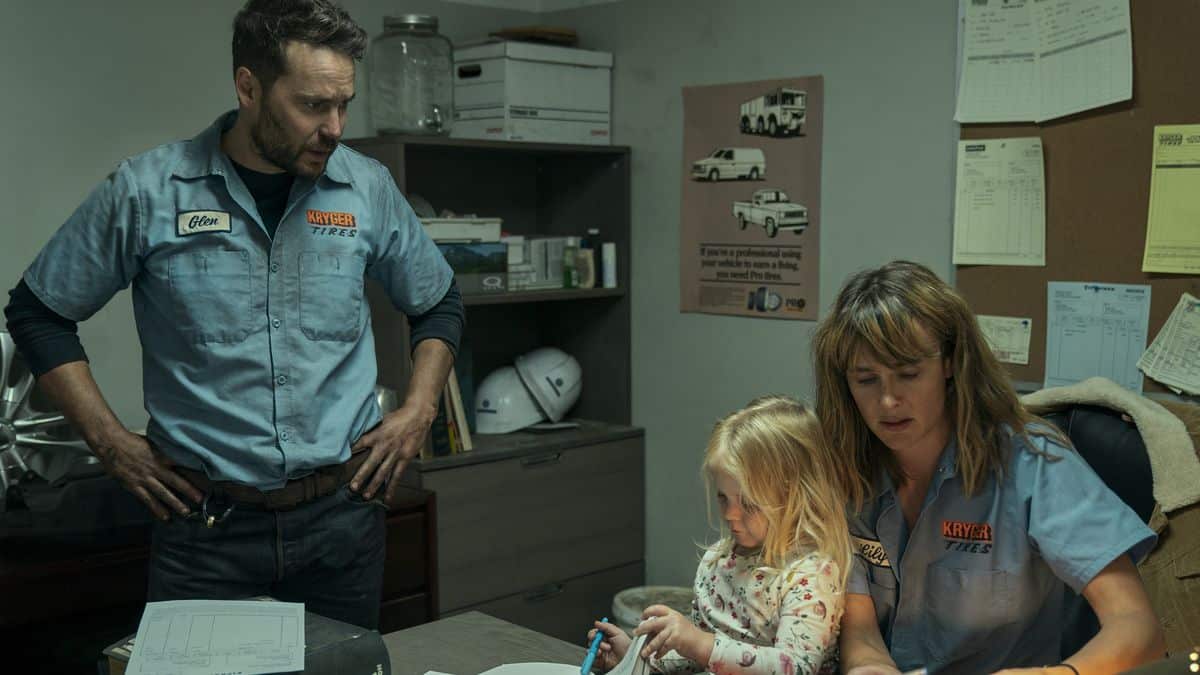Painkiller, what to watch
January 15, 2024
Last year, a popular drama series which streamed on Netflix, called “Painkiller”, helped to raise awareness around the dependency risk associated with opioid-based pain medications, certainly a risk we all need to know about.
One of the characters in the series was Glen Kryger, (played by Taylor Kitsch, pictured) a mechanic who was prescribed OxyContin after an accident at work. We watch as his life, and that of his family, is torn apart as he becomes dependent upon his pain relief medication.
It is not hard to imagine there are many others like Glen and his family among us, especially when you consider that during 2020-21 in Australia, 14 million opioid scripts were issued for pain relief (AIHW refers to PBS data).

Australia’s Annual Overdose Report also paints a concerning picture. The report, released in August 2023, which coincidentally was the same month that Painkiller was trending, shows that in 2021, opioids continued to be the most common drug type contributing to unintentional overdose deaths in Australia.
While the report’s reference to opioids included the use of heroin, it also incorporated opiate-based painkillers (such as codeine and oxycodone medications) and synthetic opioid prescriptions (such as tramadol and fentanyl).
At Drug ARM, when looking at the top prescribed drugs that adults sought primary support for during 2022-23, opioid-based pain relief medications, Oxycodone and Morphine, were among them.
One of our former clients, *Ethan, who came to us for support for a dependency on opioid-based pain medication, had an experience not unlike that of Painkiller’s Glen Kryger.
Like Glen, he had injured his back at work. When he re-injured it playing sport, Ethan was prescribed painkillers by his GP.

“I had been taking the medication, but I didn’t even realise I was addicted until the point where I had my first panic attack and that was because my script had run out,” Ethan explained.
My doctor had gone on holidays, so I couldn’t get my script until she got back… and that was when I went, ‘okay, I think I got a problem’.
During that time, Ethan found himself lying to family and friends, making up excuses not to go out, just so he could stay home and take tablets.
“I had isolated myself because of the oxy-s,” he said.
“Trying to do what I thought was the right thing, I found myself in a deeper hole.
“I’d stopped sports, work was impacted – none of that was ever an issue. Being prescribed, I didn’t see it as a problem until I had already been two years on it.”
At that time, his back was feeling better, but now his body was craving the medication and he felt stuck. While in his mind, he wanted to give them up and go back to normal, he would talk himself out of it, especially given the withdrawal symptoms were so strong, making him “cave”.
When he raised the problem, he was advised that he could go to Drug ARM for counselling, but he said it had taken him time to accept that it was not weak to ask for help.
“That was the biggest reason I didn’t go (seek help) for so long is because I said I could do this myself.
“Sometimes you can’t, sometimes it’s good to have the support…”
While he felt he had wasted a lot of time not seeking help earlier, Ethan’s story ends well. After receiving support with us, he got to put his life back together.
The streamed series, Painkiller, shows that many have not been as fortunate. It reports that over three hundred thousand people in America over the past two decades have died after overdosing on prescription opioids. This staggering toll sends a dire warning around the need for vigilance when it comes to our use of prescribed medication.
Just because a medication is prescribed does not mean you are free from the risk of dependency or the associated harms that come with it.

Australia’s Annual Overdose Report 2023 tells us that opioids contributed to 765 unintentional drug-induced deaths in our nation in 2021.
The report states that among males, 47% of these deaths involved pharmaceutical opioids (47.0%), while among females, it was much higher at 61.8%.
When we examine how many clients during 2022-23 attended Drug ARM adult counselling programs primarily for pharmaceutical dependency, we see it sits at just 5 per cent.
When we take a deeper look, however, we see that many more of our adult counselling clients, 40 per cent in fact, are using two or more drugs, which can be a combination of illicit and pharmaceutical drugs.
As our clinicians explain, “Clients come to us seeking support for the drug which is causing them the most issues. If they are taking MDMA, cannabis and sleeping pills, they will only be worried about the party drugs and don’t feel the need to talk about the others.
“In fact, clients usually have to be prompted to mention what other drugs they are taking outside of their drug of primary concern.”
This prompting can uncover a heavy use of medications, with some clients being prescribed six to eight drugs at any one time, usually for a mental health issue.
What’s more concerning is that they will be taking these medications while engaging in problematic substance use. Mixing drugs, whether legal, prescribed or illicit, increases risk of harm and can be dangerous, if not fatal.
As the recent overdose report also shows, deaths associated with multiple drug types are far more common than those associated with a single type of drug.
Over the five years to 2021, more than two-thirds of all unintentional drug-induced deaths in Australia involved two or more drug types, with the most commonly involved in these poly-substance deaths being opioids (81%), benzodiazepines (66%), anti-depressants (38%), stimulants (35%), and alcohol (25%).
Drugs in combination can:
- increase the impact on the brain and body
- be harder to predict the effects if using different classes of drugs (a stimulant with a depressant)
- have accumulative effects
- interact dangerously with each other.
“People involved in poly drug use tend to be seeking relief from something they don’t want to feel,” said one of our Brisbane based clinicians.
But this kind of use just confuses the body, which is being told by one drug to speed up and then told by another drug to slow down, causing enormous strain on the system.
“Over time, it causes so much wear and tear on the body. It can lead to health issues such as heart attack or stroke.”
Alternatively, if people use the same class of drugs, such as all stimulants or all depressants, it can create an accumulative effect.
“This is where people may be taking anti-depressants, a bit of Valium, another sleeping pill and then they drink alcohol. This affects the nervous and respiratory systems, where breathing slows down from multiple use of sedative type drugs.”
We advise clients, who are drinking alcohol or using illicit drugs with prescribed medications, that it is best to get informed and understand how the drugs are interacting with each other, and to adhere to warnings on medication labels.

“Please check with your GP or pharmacist, and ask what other drugs could interact with your medications. We also advise that you can and should ask your doctor for regular medication reviews.
“In many cases, alcohol can cause issues when mixed with medication. Yet even if it says on the packet – don’t consume alcohol in combination with the medication – people still do.”
For prescribed medication concerns, please raise these with your GP or pharmacist, or talk to a Drug ARM support worker, or other alcohol and other drug specialist, if you require support for dependency.
If you have a concern about your drinking or drug use, Drug ARM provides free support in many locations throughout Queensland. If you feel you are at risk of opioid overdose, enquire about our Naloxone and other support programs.
Last year, Drug ARM started providing free Naloxone to clients who may need it. Naloxone is a life-saving medication, which can temporarily reverse the effects of an opioid overdose. The issues outlined in this article, help to explain why our service, and many others, are stepping up responses to prevent opioid-induced deaths.
If you would like to get help from Drug ARM call our Intake Service on 07 3620 8800. If you would like to help clients like Ethan, consider how you can Get Involved.
*Ethan is not the client’s real name – changed for privacy reasons. Stock images used.